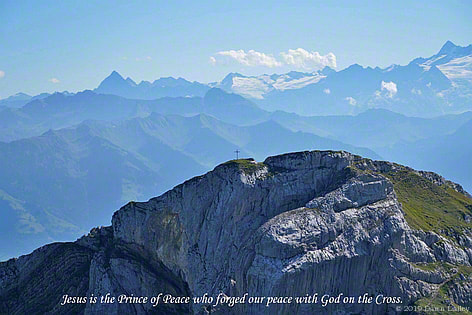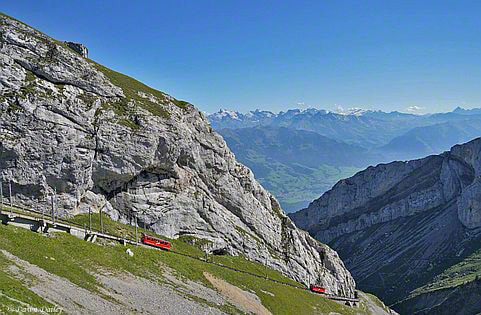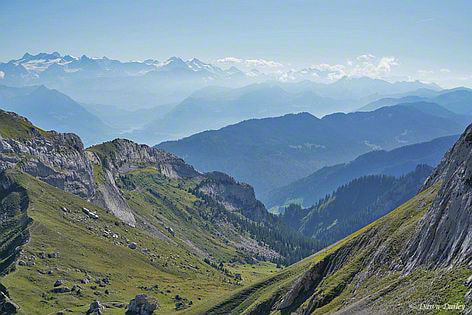Near Lucerne, Switzerland, is a massif of mountains called Pilatus. The peaks are often collectively called Mount Pilatus. The world’s steepest cogwheel railway, with its bright red trains, carries passengers up the steep incline, past grazing cattle to the snow-covered summit. The tallest peak at 7,000 feet above sea level is slightly taller than the famed Matterhorn.
Varying legends claim Pontius Pilate, the Roman governor of Jesus’ day, as the namesake of these mountains. One legend says he is buried here. Another legend says the peaks’ profile appears to be a man lying on his back, presumably Pilate. Yet another curious legend pertains to Pontius Pilate’s soul which purportedly came here to these mountains to find peace and rest. When storms create havoc on Lake Lucerne at the foot of the mountains, the locals will say “Pilate is washing his hands free of the blood of Jesus Christ.”
In John 19, we see this Roman governor question Jesus several times, trying to appease the blood-thirsty crowd whose chief aim is to see Jesus crucified. After Pilate repeatedly tells the crowd he finds no basis to charge Jesus with any crimes, he literally washes his hands in front of the people to signify he is not responsible for Jesus’ death (see Matthew 27:24). Even though it appears Pilate is somewhat curious about who Jesus really is, he seems to be more afraid of the crowd. To keep control over the rowdy mob, he hands Jesus over to be flogged and crucified. I find it interesting that as Jesus was crucified, Pilate had a sign created that said, “Jesus of Nazareth, the King of the Jews”. When questioned by the chief priests as to why he had not written that Jesus only claimed to be the King of the Jews, Pilate doesn’t budge in his interpretation of Jesus’ identity.
I wonder whether Pilate chose his words intentionally to indicate his own belief in Jesus or to ease a guilty conscience. As he tells Jesus in John 19:10, Pilate has the power to free Him. The fact that he cowered to the crowd’s angry demands instead of setting Jesus free makes me speculate if Pilate felt guilty, despite his hand washing and proclamation otherwise, in allowing an innocent man to die. I’m curious if he indeed, in accordance with the Mount Pilatus legend, searched for peace from his guilt. Did he ever find it?
How do you search for peace amidst your own guilt or in the middle of your own mistakes and errors of judgment? In dying on the Cross, Jesus takes all our mistakes, bad decisions, and guilt on Himself and exchanges them for peace with God and peace within ourselves. This peace is not as the world understands peace (see John 14:27*). It’s divine, supernatural peace that is not conjured up within ourselves. It is peace that is available to us through the Holy Spirit when we refuse to be steered by our thoughts of worry and guilt and instead park our minds on God and trust only in Him. Isaiah 26:3 says, “You will keep in perfect peace those whose minds are steadfast, because they trust in you.”
When we confess our sins, including all our bad decisions and mistakes, we are forgiven (1 John 1:9**). Pontius Pilate washed his hands of Jesus’ blood, but we have the assurance that Jesus’ blood covers all of our baggage when we leave it at the foot of the Cross. His power over death liberates us. We are free from guilt, free to live as He would have us live, and free to be at peace.
Our key verse today speaks of Jesus born long ago as a baby, full of humanity, yet completely divine. At this time of year, may the Christmas season remind us not just of “peace on earth” but that Jesus was born on Christmas to die and be raised to life on Easter. Like the shepherds on that first Christmas night, may we worship Jesus, the Prince of Peace, born in a manger, who forged our peace with God on the Cross.
Lord Jesus, before there was Easter, there was Christmas. Thank You for Your ultimate sacrifice that began in a humble manger and culminated on the Cross. I thank You for being the greatest gift of all. “For God so loved the world that he gave his one and only Son, that whoever believes in him shall not perish but have eternal life.” (John 3:16) This Christmas, Lord, may I confess my sins before You and find peace as I unwrap Your gifts of salvation, forgiveness, and love. Amen.
*John 14:27 “Peace I leave with you; my peace I give you. I do not give to you as the world gives. Do not let your hearts be troubled and do not be afraid.”
**1 John 1:9 If we confess our sins, he is faithful and just and will forgive us our sins and purify us from all unrighteousness.
Want to subscribe to future posts? Click here.
Text and photographs copyright © 2019 by Dawn Dailey. All rights reserved. Photo of view from Mount Pilatus.
All scripture quotations, unless otherwise indicated, are taken from the Holy Bible, New International Version®, NIV®. Copyright ©1973, 1978, 1984, 2011 by Biblica, Inc.™ Used by permission of Zondervan. All rights reserved worldwide. www.zondervan.com The “NIV” and “New International Version” are trademarks registered in the United States Patent and Trademark Office by Biblica, Inc.™
Mt Pilatus’ steep cog-train railway:



 RSS Feed
RSS Feed